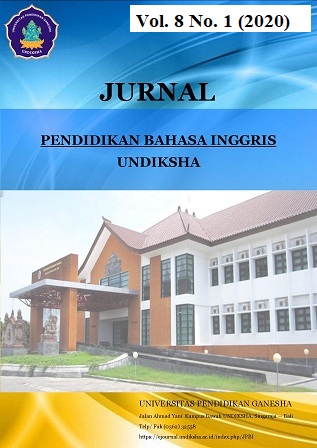THE EFFECT OF DUOLINGO ON THE VOCABULARY OF THE TENTH GRADE STUDENTS OF SMK NEGERI 1 SUKASADA IN ACADEMIC YEAR 2019/2020
DOI:
https://doi.org/10.23887/jpbi.v8i1.28643Abstract
This research aimed at investigating whether or not there was any significant effect of using Duolingo on the vocabulary of the tenth-grade students of Senior High School in SMK Negeri 1 Sukasada in academic year 2019/2020, between who taught by Duolingo Mobile Application as a technique and those who taught by using a conventional technique (students’ textbook). This experimental research was conducted by using Post-test Only Control Group Design. The sample was chosen bycluster random sampling and lottery. The samples were X Multimedia 2 as an experimental group and X Multimedia 1 as a control group. There were three kinds of instruments used in this study to collect the data namely lesson plan, vocabulary post-test and weekly observation list. The data were analyzed descriptively and inferentially by using SPSS. Moreover, the effect size was used to see the effect of using Duolingo Mobile Application as a technique on students’ vocabulary. The result of data analysis showed that the mean score of the experimental group was 78.69, while the mean score of the control group was 50.26. In addition, the Independent samples t-test was revealed that the value of the sig. (2-tailed) was 0.000. It was lower than the standard alpha level (0.05). Since (p) value was lower than the standard alpha level it can be concluded that alternative hypothesis (Ha) was accepted and null hypothesis (H0) was rejected. This result indicates that Duolingo Mobile Application as a technique give a significant effect on on the vocabulary of the tenth-grade students of Senior High School in SMK Negeri 1 Sukasada.
Key words: Experimental Research, Duolingo, Vocabulary
References
Agusta, R. (2015). Pengertian variabel independen dan variabel dependen. Retrieved 13 March, 2019, from Semua Pengertian: www.semuapengertian.com.
Ali, Zulfikar, & Bhaskar, S. B. (2016). Basic statistical tools in research and data analysis. Indian Journal of Anaesthesia, 60(9), 662-669.
Alqahtani, M. (2015). The importance of vocabulary in language learning and how to be taught. International Journal of Teaching and Education, 3(3), 21-34.
Castro, A, et al. (2016). Duolingo: an experience in english teaching. Journal Of Educational And Instructional Studies In The World, 6(4), 59-63.
Dahlan, A. (2015, September 29). Definisi sampling serta jenis metode dan teknik sampling. Retrived June 10, 2019, from Eureka Pendidikan: www.uerekapendidikan.com.
Endarto, I. T. (2017). Gamifying language testing through web-based platforms. Advances in Social Science, Education and Humanities Research, 145, 130-134.
Gafni, R, et al. (2017). Learning foreign languages using mobile applications. Journal of Information Technology Education, 16, 301-317.
Ghasemi, A., & Zahediasl, S. (2012). Normality tests for statistical analysis: A guide for non-statisticians. International Journal of Endocrinology and Metabolism, 10(2), 486–489.
Guaqueta, C. A, et al. (2018). The use of language learning apps as a didactic tool for EFL vocabulary building. Canadian Center of Science and Education, 11(2), 61-71.
Harmer, J. (2007). The Practice of English and Language Teaching. London: Pearson.
Hidayat, Nur. (2016). Improving students’ vocabulary achievement through word game. Journal of Educators Society, 1(2), 9-104.
Hornby. (1987). Oxford Advanced Learner’s Dictionary of Current English. New York: Oxford University Press.
Huynh, Duy, et al. (2016). Analyzing gamification of “Duolingo” with focus on its course structure. Springer International Publishing AG, 1(1), 268-277.
Ishikawa, L, et al. (2016). The duolingo english test and academic english. Duolingo Research Report, 16(1), 1-6.
Lakens, D. (2013). Calculating and reporting effect sizes to facilitate cumulative science : a practical primer for t -tests and ANOVAs. Frontiers in Psychology, 4(11), 1–12. https://doi.org/10.3389/fpsyg.2013.00863
Munday, Pilar. (2016). The case for using duolingo as part of the language classroom experience. RIED Revista Iberoamericana de Educación a Distancia, 19(1), 83-101.
Namaghi, S. A, et al. (2015). Vocabulary learning strategies from the bottom-up: A grounded theory. An International Online Journal, 15(2), 235-251.
Nation, P. (1994). New Ways In Teaching Vocabulary. Virginia: TESOL
Richards, J. C., & Rodgers, S. T. (2001). Approaches and Methods In Language Teaching. The Edinburgh Building: Cambridge University Press.
Schmitt, N. (2000). Vocabulary In Language Teaching. Cambridge: Cambridge University Press.
Sugiyono. (2013). Metode Penelitian Kuantitatif, Kualitatif, dan R&D. Bandung: CV: Alfabeta.
Tiro, M. A, & Ahmar, A. S. (2014). Penelitian Eksperimen: Merancang, Melaksanakan dan Melaporkan. Makassar: Andira Publisher.
Tornbury, S. (2002). How To Teach Vocabulary. England: Pearson Cambridge University Press.
Tunchalearnpanih, P. (2012). Using Games On Students’ Vocabulary Learning. Thailand: Srinakharinwirot University (SWU)
Widyastuti, M, et al. (2018). Penggunaan aplikasi duolingo dalam meningkatkan kemampuan kosakata Bahasa Inggris pada tenaga pengajar bimbingan belajar omega sains institut. Jurnal Pengabdian Kepada Masyarakat, 1(2), 237-244.
Ye, F. (2014). Validity, Realibility, and Concordance of the Duolingo English Test. Pennsylvania: Technical Report, University of Pittsburgh.
Published
Issue
Section
License
Authors who publish with the Jurnal Pendidikan Bahasa Inggris Undiksha agree to the following terms:- Authors retain copyright and grant the journal the right of first publication with the work simultaneously licensed under a Creative Commons Attribution License (CC BY-SA 4.0) that allows others to share the work with an acknowledgment of the work's authorship and initial publication in this journal
- Authors are able to enter into separate, additional contractual arrangements for the non-exclusive distribution of the journal's published version of the work (e.g., post it to an institutional repository or publish it in a book), with an acknowledgment of its initial publication in this journal.
- Authors are permitted and encouraged to post their work online (e.g., in institutional repositories or on their website) prior to and during the submission process, as it can lead to productive exchanges, as well as earlier and greater citation of published work. (See The Effect of Open Access)













